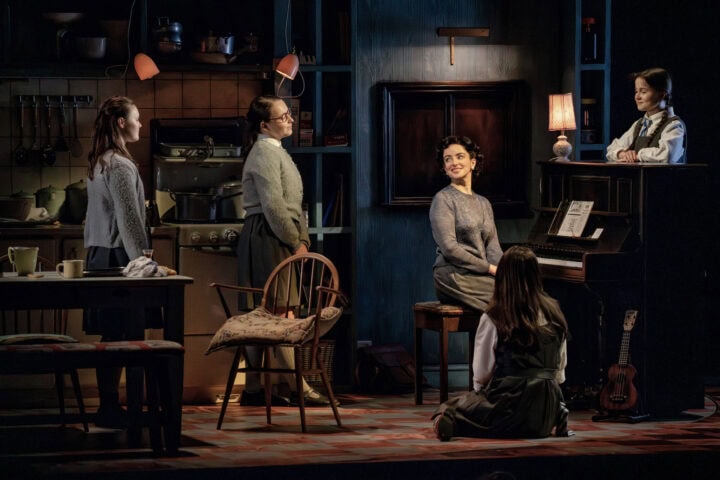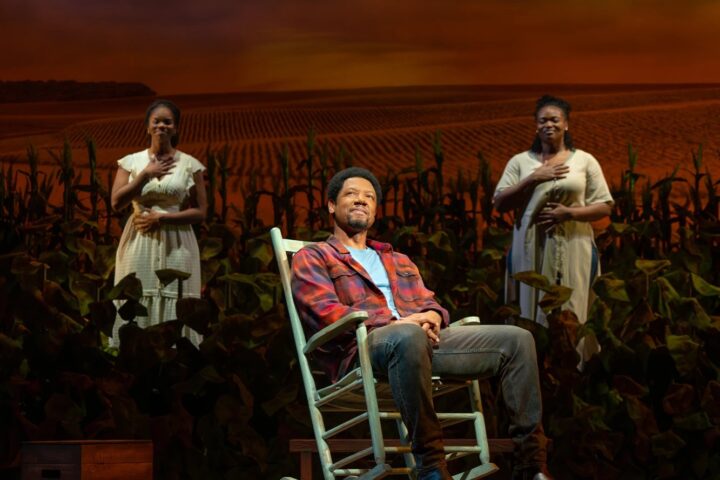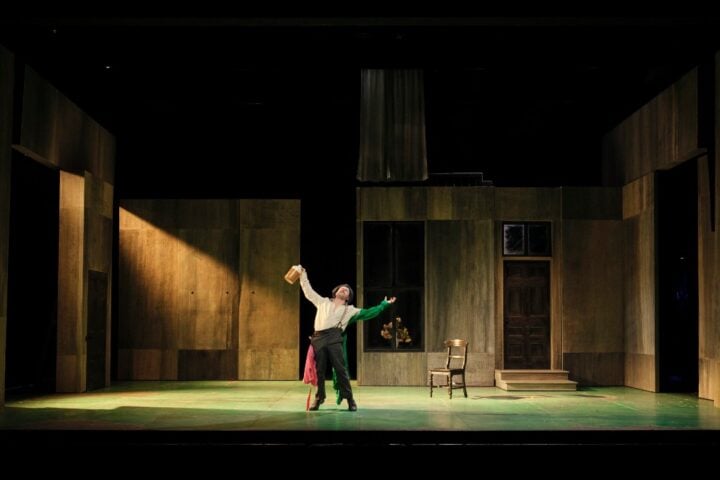“Segregation is a ridiculous institution and it makes decent people do ridiculous things,” playwright, actor-director, and activist Ossie Davis told the New York Times on September 24, 1961, four days before his play Purlie Victorious: A Non-Confederate Romp Through the Cotton Patch opened on Broadway, co-starring himself and his wife, Ruby Dee. “Maybe if they can be made to laugh at it they can see how absurd it is.”
Especially on a Great White Way where actors played predominantly to white audiences that had seen few comedies by Black playwrights, let alone satires on segregation, Purlie Victorious must have been a jolting event. Though the play, which ran for nearly eight months on Broadway, begat a film adaptation in 1963 (Gone Are the Days!) and the successful musical Purlie in 1970, Davis’s comedy about an aggrieved “self-made minister” righteously “disembezzling” a racist plantation owner has largely faded from popular memory.
Opening one day shy of the 62nd anniversary of the original opening night, director Kenny Leon’s new revival sends revitalizing currents through the long-dormant text, thanks to a bevy of boisterously engaged performances. But unlike Leon’s recent Broadway revivals of plays that felt blisteringly fresh—Suzan-Lori Parks’s Topdog/Underdog and Adrienne Kennedy’s Ohio State Murders last season and Charles Fuller’s A Soldier’s Play in 2020—Davis’s play never fully leaps out from the archives despite the cast’s entertaining efforts to justify its reemergence.
When Purlie Victorious Judson (Leslie Odom Jr.) returns to Georgia after years as a traveling preacher, he brings with him Lutiebelle Gussie Mae Jenkins (Kara Young), a kitchen maid he’s met who vaguely resembles Purlie’s late cousin Bea. He’s enlisted Lutiebelle to aid him, his brother Gitlow (Billy Eugene Jones), and Gitlow’s wife Missy (Heather Alicia Simms) in obtaining $500 that Bea inherited. Though Purlie’s next in line for the cash, it’s been pocketed by plantation owner Ol’ Cap’n Cotchipee (Jay O. Sanders). If Lutiebelle can convince Cotchipee that she’s really Bea, Purlie will use the money to buy back his old church, all while avenging his personal score against Cotchipee, who beat him with a bullwhip 20 years ago.
In the early stages of the play, Odom Jr.’s Purlie, monomaniacally consumed with his plot to repurchase his church, really comes to life whenever the actor embraces the preacher’s rhetorical flourishes: “Drowned is her youth in thankless Southern dishpans!/Her beauty spilt for Dixiecratic pigs!” Purlie gushes about Lutiebelle, Odom Jr. relishing the moment that the text literally turns for a few lines to iambic pentameter. Purlie’s an inventor of dreams, but he also means what he says sincerely, even if it’s a truth-in-progress. “I ain’t never in all my life told a lie I didn’t mean to make come true, some day!” he reassures his friends.
But at least for the play’s first hour, the center of gravity is Young’s Lutiebelle, goofily glorious as she learns to subdues her terror at being asked to take on the part of the highly educated Bea. Lutiebelle leans on gesture in the same way that Purlie luxuriates in language, contorting herself desperately to appear “alert, wide awake, and up on my toes” as, Pygmalion-like, Purlie has instructed her. Young is by far the funniest part of Purlie Victorious, but, to draw a recent comparison, like Annaleigh Ashford’s uproariously scene-stealing Mrs. Lovett in Sweeney Todd, the balance of the show tilts, for good or ill, toward a single performance, even if the play itself weights other anchors, like Purlie’s (not to mention Sweeney’s incomparably different) quest for justice. And by following Young’s lead down a path of farcical physical comedy, Leon’s madcap staging, at its broadest, sometimes verges away from crispness toward chaos.
In 1961, Davis posed a question to Broadway audiences—essentially, are these caricatures or full people?—and the response could be revelatory, at least to Howard Taubman, the New York Times critic who raved, “It is the Negro characters whom Mr. Davis has brought to life with freshness and vitality as if for the first time they were being presented from the inside.”
Now, though, with more than half a century’s distance, the answer seems to lie somewhere in the middle. For as intelligent, compassionate, and rhetorically specific as the characters may be, Davis doesn’t give them much chance to evolve together or surprise each other: Conflict between Purlie and Gitlo resolves almost instantly, and missteps or mistruths are instantly forgiven.
That’s in part because the play’s heroes are united against an ignorantly malevolent force, Cap’n Cotchipee, who parodically represents the blind dogma of racism. In the grand tradition of the eminently dupable, like Ben Jonson’s wealthy pomposities in early modern plays like The Alchemist and Volpone, Cotchipee can’t possibly believe that he’s being played, even when Purlie reveals at a critical moment that the Cap’n’s just been named the “Great White Father of the Year” by his Black sharecroppers. Becoming almost weepy at this honor, Cotchipee (in an outsize performance that Sanders nails) proclaims, as if convinced Purlie and Gitlow will agree with him, “to hell with Abraham Lincoln and Martin Luther King!” Cotchipee is so entirely hard-wired with discrimination that he even terms the integrationist advocacy of his son, Charlie (the affably rebellious Noah Robbins), “biologically impossible.”
But how, dramatically speaking, can fully fleshed-out human beings contend with so ridiculous an enemy, a baddie who’s so predictable in his badness that Purlie tells Lutiebelle, word for word, what lascivious phrases Cotchipee will lavish upon her when they meet? That was Davis’s point—exposing the “ridiculous institution” of segregation—but it’s a contrast that neither the text nor Leon’s production ever quite gets right. You may often laugh throughout the play. You may even feel the well-earned anger radiating from Purlie and his family, especially in a late, turbulent monologue for Odom Jr. and in Jones’s wonderful unpeeling of Gitlow’s discomfort with his long years playing the part of Cotchipee’s groveling lackey. But it’s rare that the play’s silliness and sobriety intermix—that the knot of satire ever gets tied tightly enough.
The parts, though, do rise above the whole, including Derek McLane’s rather stunning set, which slides in, windowpanes locking into place, to transform the wood-framed walls for each scene before metamorphosizing in a final transition that offers the play’s most emotionally transcendent moment. And in a final sermon, Purlie erupts into gorgeous, empowering poetry: “I find, in being Black, a thing of beauty…Be loyal to yourselves: your skin; your hair; your lips, your southern speech, your laughing kindness—are Negro kingdoms, vast as any other.” If Purlie Victorious never completely conquers in cohering its disparate ambitions, its last moments offer an unexpected, quiet triumph.
Purlie Victorious is now running at the Music Box Theatre.
Since 2001, we've brought you uncompromising, candid takes on the world of film, music, television, video games, theater, and more. Independently owned and operated publications like Slant have been hit hard in recent years, but we’re committed to keeping our content free and accessible—meaning no paywalls or fees.
If you like what we do, please consider subscribing to our Patreon or making a donation.






